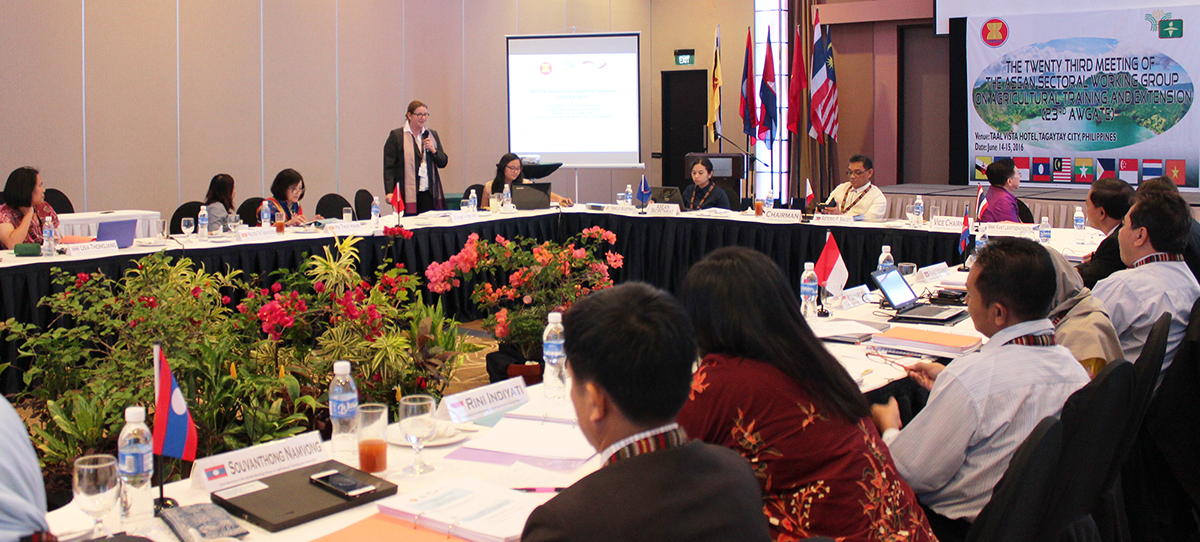Sustainable Agriculture: MOSA concept tailored for ASEAN
The ASEAN Sustainable Agrifood Systems project[1] collaborates with ASEAN and all of its 10 member states (AMS) in implementing the ASEAN Integrated Food Security Framework (AIFS) and its Strategic Plan of Action on Food Security (SPA-FS)[2] at the national level to promote food security and the development of sustainable agriculture[3]. To implement the sustainability approach in everyday practice, a crucial step lies in strengthening the capacity of all stakeholders involved. A broad acceptance of the sustainable agriculture approach requires not only a suitable political framework, but also the willingness, understanding and awareness of all parties involved − and the farmers who ultimately put this approach into practice. Therefore, the ASEAN SAS project[4] seeks guidance and support from the ASEAN Working Group on Agriculture Training and Extension (AWGATE).
To bring sustainability into practice, the Sector Project Sustainable Agriculture (NAREN) [5] developed MOSA (Modules of Sustainable Agriculture). MOSA consists of 17 modules that convey a holistic concept of sustainable agriculture – based on the political, social, economic and ecological dimensions within the context of climate change and food security.[6] A MOSA-Reader[7] as well as a Trainer manual and course materials (powerpoint presentations as well as excercises) have been developed and successfully implemented in several countries (Cameroon, Ecuador, Germany, India) and will now be adjusted to the ASEAN context.
MOSA − a tool for a capacity development upgrade in the ASEAN region
Since the MOSA concept is geared to global needs, it seems necessary and appropriate to adapt the existing modules to suit the specific needs and individual local features of Southeast Asia. This requires the assistance and support of all AMS. ASEAN SAS therefore considered it important to present the development concept for sustainable agriculture to the AWGATE to ensure that the MOSA modules and the associated Capacity Development activities are tailored to the relevant ASEAN needs. An expert workshop as well as a pilot training dedicated to strengthening sustainable agriculture through know-how multipliers is envisaged for September/October 2016 − in cooperation with AWGATE, NAREN and ASEAN SAS.
Guidance and support of the AWGATE is of high relevance
At the 23rd AWGATE Meeting, ASEAN SAS introduced the development concept for sustainable agriculture to the ASEAN member states and requested the delegates of the AWGATE meeting to provide guidance and comments on MOSA as a framework for sustainable agriculture and to support the mobilization of local experts from the respective AMS in customizing the modules. Delegates were also asked to engage national/regional institutions in the ASEAN region for possible delivery of capacity development services.
AWGATE delegates have shown great interest in the already existing “MOSA capacity strengthening concept” and agreed that there is indeed a need to adapt the concept to the local circumstances of the AMS. In addition, they recommended “to include food production in marginalized areas” and expressed the interest in “engaging with MOSA particularly on Organic Agriculture and Climate Change Adaptation and Mitigation.“
The delegates acknowledged MOSA as the framework for training and capacity development including the collaboration in engaging with regional and national institutions in refining MOSA for the ASEAN region. Furthermore AWGATE “welcomes continuing Capacity Development in the Field of Sustainable Agriculture in line with the Strategic Plan of Action (SPA) of AWGATE (2016-2020).”[8]
First implementation steps towards MOSA for ASEAN
The next step will be for local experts from the AWGATE to review and adapt the modules to the ASEAN context, working together with ASEAN SAS and NAREN.
During a pilot training planned in September/October 2016, the adapted materials will be tested and the first “MOSA for ASEAN Master Trainers” be trained with the aim of strengthening sustainable agriculture through knowledge multipliers.
The participants of this pilot training will include members of the Focal Points of AWGATE and partners of ASEAN SAS. The long-term objective is to embed the modules in regional/national training institutions in the respective regions, in order to disseminate this country-specific agricultural sustainability know-how to the broadest possible spectrum of practitioners.
The initiative envisages to ensure a continuous knowledge transfer and awareness-raising regarding the importance of sustainable agriculture. It also aims to enhance Capacity Building in the AMS by enabling people to develop technical and managerial solutions with a view to sustainability, climatic challenges and the resilience of livelihood systems,
MOSA and SNRD Asia Considering that capacity development is a core and cross-cutting topic under the Working Group on Agriculture, MOSA is seen as a framework for sustainability practices within agriculture and beyond. Through a tailor-making process for ASEAN, it is envisaged that members of the Working Group could adapt to their respective project and country context resulting in achieving the concerned Sustainable Development Goals.
Further information:
MOSA for ASEAN contact: Elisabeth Fischer, Capacity Development Advisor, ASEAN Sustainable Agrifood Systems (ASEAN SAS), elisabeth.fischer@giz.de
MOSA contact: Friederike Kraemer, Advisor Sector Project Sustainable Agriculture, NAREN, friederike.kraemer@giz.de
[1] For more information about this project: www.asean-agrifood.org/ and www.snrd-asia.com
[2] AIFS download available: http://www.asean-agrifood.org/resources/
[3] For further information on sustainable agriculture (brochure) see: https://www.giz.de/expertise/downloads/giz2015-en-sustainable-agriculture.pdf
[5] More information about SV NAREN: https://www.giz.de/expertise/html/7343.html
[6] More about the training concept: https://www.giz.de/expertise/downloads/giz2016-en-flyer-mosa.pdf
[7] MOSA Reader: https://www.giz.de/expertise/downloads/giz2016-en-mosa-reader.pdf
[8] Excerpt from the SPA of AWGATE: The Strategic Plan of Action (SPA) of ASEAN Working Group on Agriculture and Training Extension (AWGATE) currently indicate their activities as:
1. Establishment and maintaining of an information network for ASEAN Member Countries in agricultural and agro-forestry technology transfer, training & extension programmes
2. Development and implementation of collaborative training and extension programmes
3. Trainings under the South-South Cooperation Project implemented



